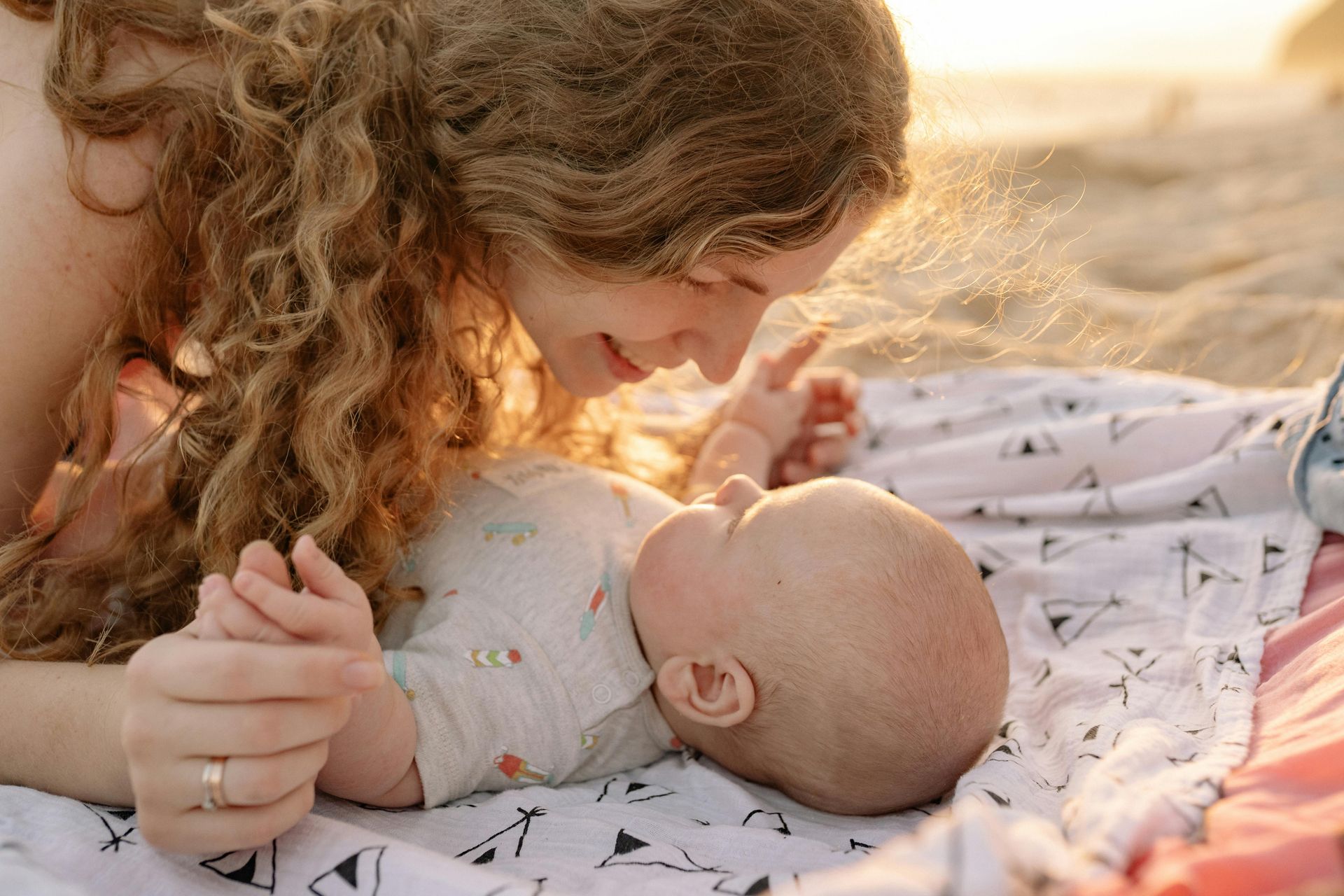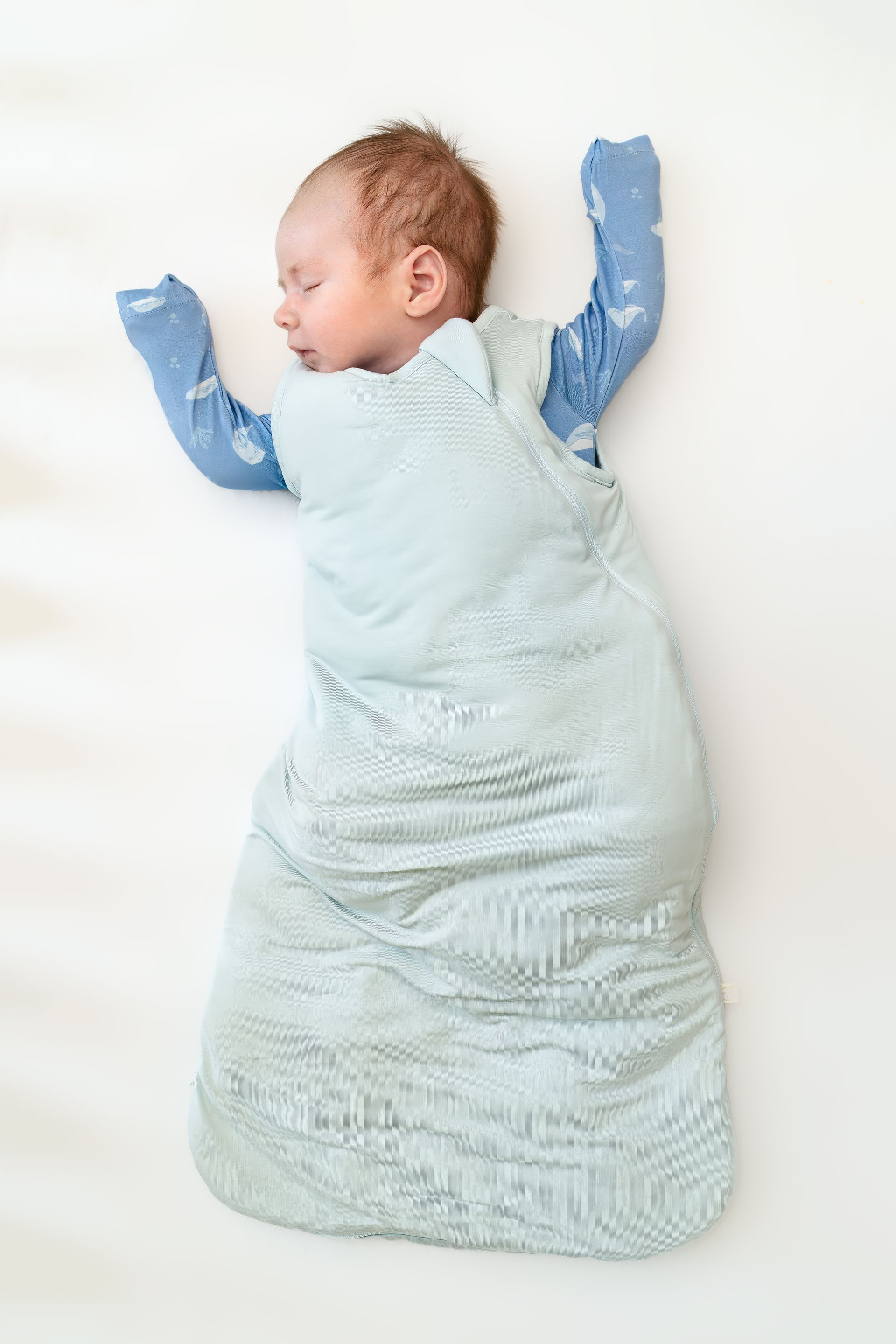Baby Waking Up at Night? Check this out...
lbenjell • October 18, 2021
Some questions to ask regarding night wakes.
Written by Lamis Benjelloun
The truth is, no one really sleeps through the night. We all experience night wakings but rarely ever remember them. This is due to the way our sleep is composed. From the moment we lay down, we start moving through sleep cycles. Several of them. And these cycles themselves are made up of different periods of light sleep, deep sleep and REM sleep (Rapid Eye Movement). So even as we are sleeping through just ONE cycle, we can have different states of alertness and sleep. The same goes for our babies. So what do we really mean when we say a baby sleeps or doesn’t sleep through the night. This is an important distinction to make because a baby that is experiencing a slight arousal at the end of a sleep cycle does not equate one that is experiencing night wakes that interrupt their own sleep as well as that of their parents.
Today we talk about those night wakes that last longer than a few seconds. There is a number of reasons why they happen and we will explore them together. At the end of reading this, you will hopefully have a checklist that will help you find out why your baby is waking up so much at night.
Where is your child, developmentally?
The first important question we have to ask, if your baby is waking up at night is : is it expected. Babies under the age of 4 months are not developmentally ready to sleep through the night without assistance. This means that they will be up several times at night and will require help from you to go back to sleep. In addition, their circadian rhythms are also not developed yet so their cycles are different to ours : they spend a large portion of their time asleep in what is called “active sleep”. During this time, babies have been known to move, grunt, whimper and cry. So while we may feel like they are awake, they are in fact sleeping and our need to go help them may be the cause for an actual wake up. So the next time you are woken up by a stirring newborn, consider swaddling them and using white noise. Containing them in a cosy swaddle may reduce how much flailing happens in the middle of the night.
Is he or she hungry?
We often default to thinking that every time our baby wakes up at night, it must be because they are hungry. And this is true at first : newborns have immature digestive systems and therefore require frequent feedings, even in the middle of the night. But as they get older, so do their little tummies, which means that they can last longer without a feed. What ends up happening though is that baby gets accustomed to being fed every time they stir at night and come to expect it, even if they are not hungry. This is why I encourage parents to attentively listen to their babies at night : why is baby calling for me at 2 am : is it time for their feed ? Do they need a diaper change ? Or do they just need my comforting touch ?
Medical causes behind night wakes?
Believe it or not, not all night wakes are caused by hunger or habit. Sometimes, there are medical conditions that may waken our little ones. The common flu, teething or any number of discomforts can disturb baby’s sleep but sometimes, less common conditions may be the culprit. Reflux, Eczema and Obstructive Sleep Apnea are ones that come to mind right away but always approach your pediatrician to check that your baby is clear of physical reasons behind their night wakes.
Environmental interruptions?
Where we sleep matters. Light, temperature, sounds, all of these things affect our sleep and they affect our little ones sleep as well. If we promote an environment that is most helpful to our babies’ sleep, they will not be unnecessarily woken up by a chirping bird, a sibling’s trip to the potty, a flickering light from the monitor or a change in temperature in the middle of the night.
Schedule adjustments?
The timing and length of naps, as well as the timing of bedtime are prime indicators of the quality of your night sleep. As you have probably heard before, these three elements can determine whether your child is undertired, overtired or “just right”. Unfortunately for us, both an undertired child and an overtired child will experience night wakes. So perhaps the most important place to look at when evaluating your baby’s night sleep is their daytime sleep.
Where are they falling asleep?
“Most children will sleep well only if there are no surprises, no changes after they sleep, and no need for them to check where they are and where their parents are every time they stir.” – Richard Ferber
This means that baby needs to fall asleep in the same place they wake up, otherwise, they become alarmed and a slight arousal turns into a full wake up. So a baby who falls asleep in mom’s arms will be confused when they find themselves in their crib in the middle of the night. When placing baby in the crib awake and aware of their sleep location, they will be able to situate themselves if they have a night wake and be less alarmed.
I hope this helps you figure out whether your child’s night wakes are normal or not… and if they are not, that you know where to start to fix them.

Choosing a car seat is one of the most important decisions you’ll make as a parent. It’s not just about convenience — it’s about giving your child the best protection on every journey . In the UAE, where we drive long distances, face busy roads, and deal with extreme heat, the right car seat matters more than ever. But with so many options, how do you know which one to choose? Here are our top 4 tips to make car seat shopping easier — and safer. 1. PRIORITIZE SEATS THAT UNDERGO THE TOUGHEST CRASH TESTING Not all car seats are created equal. Many parents think if a seat is “legal,” it must be safe — but that’s not always true. ECE R44 : The most basic standard, now phased out in Europe. ECE R129 (i-Size) : Stricter testing with better head, neck, and side-impact protection. The Swedish Plus Test : The toughest crash test in the world — and the gold standard. What makes the Swedish Plus Test so important? It’s the only test that measures neck forces on a child’s body in a crash. Seats that pass prove they can keep neck loads below dangerous limits — a key factor in preventing serious injury. Many car seats fail completely under this extreme test, which shows just how high the bar is. 👉 If a car seat has passed the Swedish Plus Test , you can be confident it offers the highest level of safety for your child. 💡 Remember: Legal does not always mean safe . Go beyond the minimum. 2. CONSIDER YOUR CHILD'S HEIGHT, WEIGHT, AND AGE — EVEN THE SMALLEST ONES Every child grows differently, and size matters when it comes to safety. Preemies and smaller babies : Standard carriers often don’t provide the right fit. They need extra support for the head, neck, and body, plus proper harness positioning. Twins or multiples : Planning seating for two (or more) at once requires careful choice so every child gets the safest setup. As children grow, their height and weight percentiles determine how long a seat will last. We recommend car seats with at least a 25kg weight limit and 125cm height limit , which allow for extended rear-facing travel . Why rear-facing ? Research shows it is up to 5 times safer than forward-facing for children up to 6–7 years old. Better crash force distribution across the strongest part of the body. Superior head and neck protection , preventing the whip-forward motion that can cause spinal injury. Cocoon-like shell protection against front and side impacts. 💡 Bonus for UAE parents: The BeSafe Go Beyond with Preemie Inlay was designed with neonatal nurses to support even the tiniest babies. It features a removable wedge for better harness fit and breathable mesh fabric — keeping your baby safe and cool in our hot weather. 3. MATCH THE CAR SEAT TO YOUR CAR AND LIFESTYLE Your car seat needs to fit not just your car — but your daily routine . Multiple cars? Choose a seat that’s easy to install/uninstall. Growing family? Invest in a seat with a long lifespan that can be passed down. Seat placement? Consider if it will go behind the passenger, in the middle, or side by side with another child seat. Bigger families? Narrow but safe seats can fit 3-across or work well in 7-seaters, without compromising protection. Example from our family setup: Mummy’s car : BeSafe Flex Fix 2 for Sofia (8y) + BeSafe Stretch for Leo (5y). Daddy’s car: Axkid One3 for Leo + BeSafe Flex Fix 2 for Sofia. The Axkid One3 was chosen because Daddy often removes the seat, and installation takes under 30 seconds . 👉 Key takeaway: The “best seat” isn’t the one your friend uses — it’s the one that fits your child, your car, and your lifestyle . 4. DON'T COMPROMISE — BUY FROM A CHILD CAR SEAT SPECIALIST Buying from a specialized retailer ensures peace of mind: They recommend a seat that fits your child, car, and routine . They install it correctly and show you how. If the seat doesn’t fit, they won’t install it — and they’ll help you find one that does. They’ll reinstall it whenever you need , for example when changing cars, at no extra cost. At Safety On Board , we offer 1-1 car seat consultation and hands-on support to make sure your child rides safely every time. FINAL THOUGHTS A car seat isn’t just another baby item — it’s life-saving equipment. Whether you’re bringing home a preemie, juggling twins, or moving a big kid into a booster, the right seat + the right suppor t makes all the difference. If you’re unsure where to start, contact us and book a consultation with us. We’ll help you find the perfect fit for your child, your car, and your family. Because every child in the UAE deserves the safest ride 💛 Sophie Huang is the founder of Safety on Board , the UAE’s first child car seat specialist. She is also a mom of 2 and an internationally certified car seat expert . With a passion for keeping children as safe as possbile on UAE road, she guides parents in choosing and installing the safest car seats. Sophie believes safety can be simple, stress-free, and empowering for every parent.

There’s something magical about a beach holiday — the sound of waves, salty air, and the promise of slow days in the sun. But let’s be honest: traveling to the beach with a baby isn’t exactly a vacation unless sleep is part of the equation. Whether you're heading to a resort, renting a seaside villa, or visiting family by the coast, here’s how to set your baby up for restful sleep — so everyone gets to enjoy that ocean breeze. Step 1: Know That Sleep Needs Don’t Take a Holiday Babies are creatures of habit. Their little bodies thrive on rhythm and predictability — even on vacation. But that doesn’t mean you can’t have fun or go with the flow! It just means that your baby’s sleep needs are still there, and the better prepared you are, the easier it will be to keep things (mostly) on track. Step 2: Your Beach Baby Sleep Packing List Here’s your ultimate baby sleep packing list for a beach trip, broken down by category: Sleep Environment Essentials : Portable travel crib or bassinet – Choose one your baby is already familiar with if possible. Fitted sheets – Bring 2-3 just in case of sand, spills or spit-up. Also bring a gently used one to remind baby of home as he/she adjusts to the new sleep environment. Portable blackout blinds – Beach homes and rentals often have light, sheer curtains. White noise machine or app – Helps block out unfamiliar sounds like waves (yes, they can be loud!) or street noise. Baby monitor (if you’ll be in a larger space or stepping outside during naps). For more on the ideal sleep environment, have a read here . Comfort + Routine : Lovey or comfort object (if age-appropriate and safe for sleep). Sleep sack – Choose a breathable, summer-weight one. Favorite bedtime book – Familiarity brings comfort. Pacifiers – Always bring extras! Nightlight – A soft, warm one if needed for feeds or changes during the night. Weather + Climate Considerations : Lightweight, breathable pajamas – Think cotton or bamboo Fan – If your rental lacks good airflow or AC Bonus Tip: Have a “Nap-on-the-Go” Kit **For beach days that cut into nap time: Clip-on stroller fan Stroller or baby carrier your baby can sleep in Portable white noise machine Extra sun hats + baby-safe sunscreen (for after 6 months old) Step 3: Keep the Routine (Even on the Coast) Try to mirror your bedtime routine as closely as you can. If you usually do bath → PJs → book → feed → sleep, stick with it — even if it’s a quick version. Babies love the predictability, and it helps signal that it’s time to wind down, even in a new environment. Also, aim for naps in a darkened room when possible, especially after a stimulating beach outing. And if one nap has to happen in the stroller under a palm tree? That’s totally okay. Just go back to the routine as soon as you can. Getting There: Travel Day Tips Time your departure around naps if possible Use familiar sleep items (like the sleep sack or pacifier) during flights or drives Offer extra feeds — travel is dehydrating, especially in hot weather Keep expectations flexible – sleep may not be perfect, and that’s fine Beach trips with a baby can be full of joyful memories and restful nights — as long as you plan for sleep. With the right gear and mindset, your little one can stay well-rested and content, giving you more time to soak up the sun (or at least drink your coffee while it’s still warm!). And remember: sleep doesn’t have to fall apart just because you’re away from home. If you ever feel stuck or unsure about how to adjust things before, during, or after a trip, I’m here to help you build a personalized plan that fits your family’s travel style. Book your discovery call here .

October is SIDS Awareness Month, dedicated to raising awareness about Sudden Infant Death Syndrome. It’s a time to educate parents and caregivers on safe sleep practices that can reduce the risk and help protect our little ones.. At Hushabye, safety is at the heart of our brand. Our focus is on providing parents with safe and high-quality baby sleepwear, such as sleep bags, that offer a safer alternative to traditional blankets. What is a baby sleep bag? A baby sleep bag, also known as a wearable blanket or sleep sack, is a specially designed garment for infants and young children to wear during sleep. The primary purpose of a sleep bag is to keep the baby warm and comfortable, but it also serves as a safe and convenient alternative to traditional blankets and quilts in a crib or cot.


